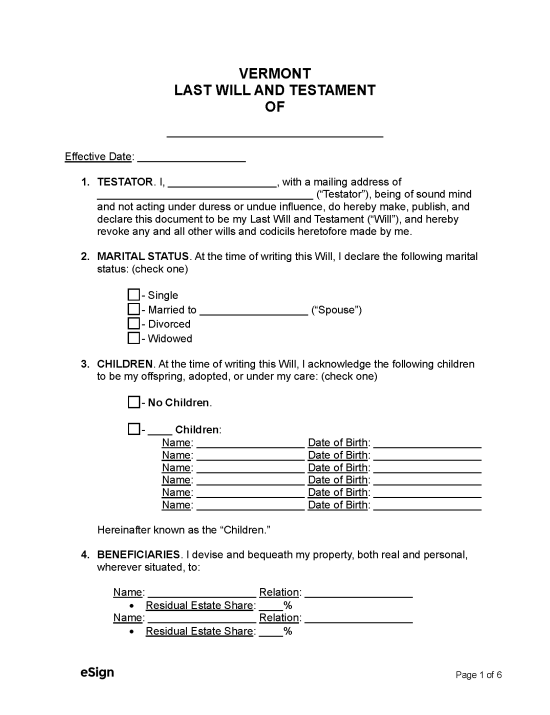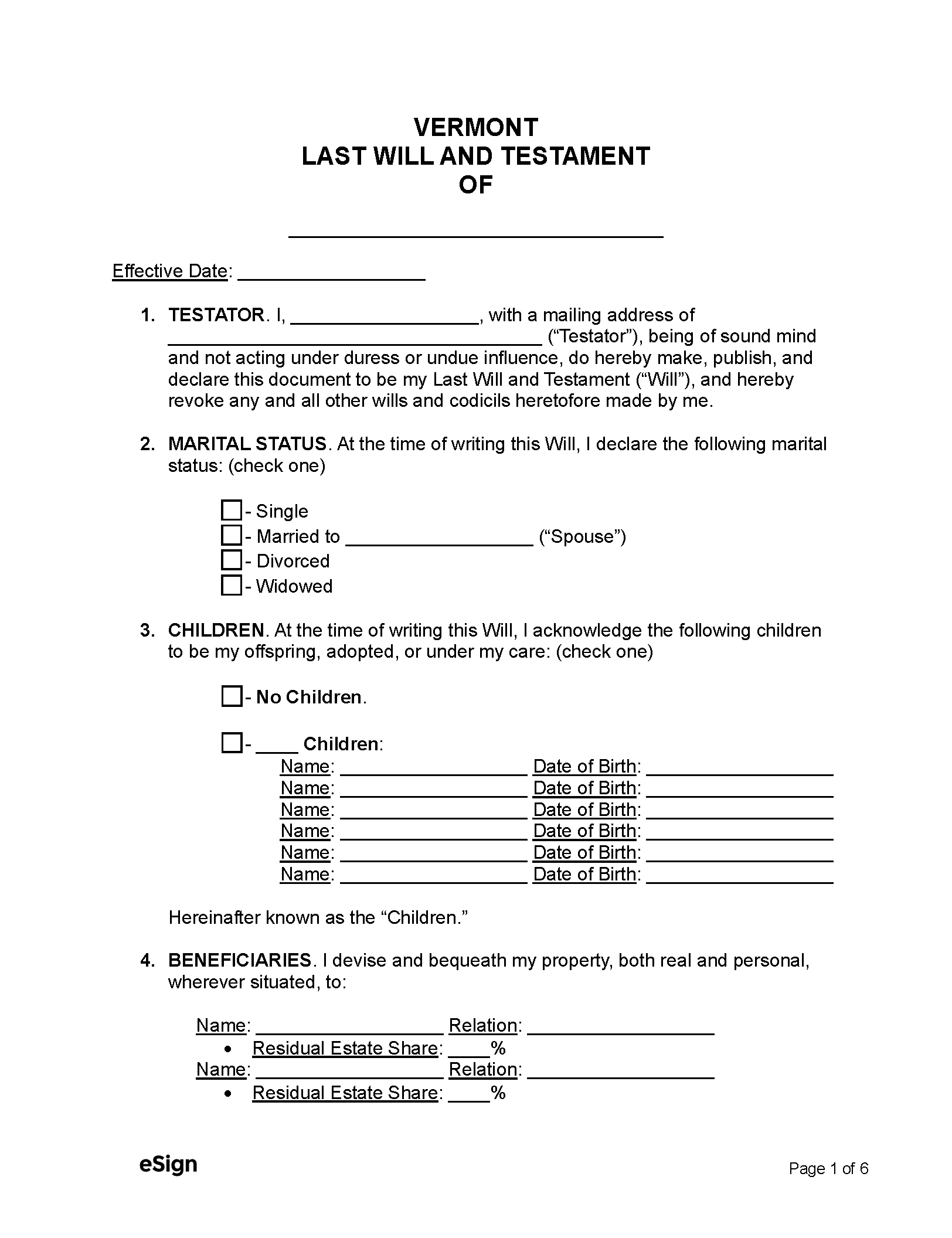State Laws
Vermont residents can make a will if they are at least 18 years old (or emancipated) and of sound mind.[1]
Holographic Wills – Unwitnessed wills are not valid in Vermont.[2] However, individuals on active military duty may execute a holographic will.[3]
Revocation – Wills in Vermont may be revoked by[4]:
- Executing a new will.
- Physically destroying the original document.
- Signing a revocation document with two witnesses present.
Signing Requirements – The will must be signed by the testator and two witnesses.
Probate Process in Vermont (10 Steps)
Probate is the process where the will is authenticated, and the court appoints an executor to pay creditors and distribute assets to beneficiaries as designated in the will.
- File the Petition
- Hearing on Petition (If Applicable)
- Post Bond (If Applicable)
- File Inventory
- Spousal Rights
- Notify Creditors
- Pay Claims
- File Tax Returns
- File Final Summary of Account
- Close the Estate
1. File the Petition
If the decedent’s estate is valued at $45,000 or less and contains no real estate, a Petition to Open Small Estate may be filed to simplify the probate process.[5]
When the testator passes away, the person who has the will has 30 days to deliver it to the executor or the probate division of the superior court in the county where the decedent resided.[6] The individual who wants to open probate must file the Petition to Open Decedent’s Estate.[7] They must also submit the following:
- The original will
- A copy of the death certificate – May be ordered through the Vermont Department of Health.
- The List of Interested Persons
If all the heirs at law sign the consent section of the Petition to Open Decedent’s Estate, the court will appoint the executor and approve the will without a hearing.[8] If the executor cannot obtain consent from all of the heirs, or there are beneficiaries other than lawful heirs named in the will, a hearing must be held.
2. Hearing on Petition (If Applicable)
If a hearing is required, the court will send the executor a Notice of Hearing to be served on each heir and beneficiary with a copy of the will and Petition. The executor will file a Certificate of Service to show that the interested parties have been notified. Those parties will then have seven days to file any objections.
At the hearing, the court will determine who the executor should be and allow the will to be probated if determined valid.
3. Post Bond (If Applicable)
Before the executor can be officially appointed, they must file an Estate Administration Bond.[10] The bond acts as an insurance policy to guarantee the executor meets their obligations.
In some cases, the court may not require a surety on the bond. The heirs at law may also consent to waive surety by signing a Waiver of Surety on Estate Administration Bond.
Once the executor posts bond, they will officially be appointed and given custody of the estate. The court will give the executor a Certificate of Appointment, or Letters Testamentary, to prove that they have the authority to handle estate affairs.
4. File Inventory
The executor will be required to file an Inventory Schedule within 60 days of their appointment.[11]
A copy of the Inventory Schedule must be served on all interested persons with a Certificate of Service filed with the court.
5. Spousal Rights
6. Notify Creditors
The executor must publish a Notice to Creditors in a local newspaper within 30 days of their appointment. A copy must also be filed with the court and sent to each known creditor.[13] A copy of the Notice to Creditors must be filed with the court within 14 days of publication, and a copy must also be sent to any known or reasonably ascertainable creditor.
The notice gives creditors four months to make a claim against the estate.
In some cases, the executor may file a Motion to Waive Notice to Creditors to ask the court to waive notice[14]. Creditors have one year to file a claim if the waiver is accepted.[15]
7. Pay Claims
Four months after publishing the Notice to Creditors, the executor may pay the claims against the estate.[16] If the estate does not have sufficient funds to pay all claims, they should be paid in this order:[17]
- Administration expenses
- Funeral, burial, and headstone expenses that do not exceed $3,800, as well as necessary hospital and medical expenses for the decedent’s final illness
- Wages owed to employees of the decedent, not exceeding $300
- All other claims
Creditors should give evidence of payment to the executor to be filed with the court.
8. File Tax Returns
The estate executor will be required to handle all tax returns for the estate and the decedent. In most cases, a U.S. Individual Tax Return must be filed with the IRS, and Form IN-111 Vermont Income Tax Return must be filed with the Vermont Department of Taxes.
If the estate generated a certain income level, a Federal Fiduciary Tax Return and a Vermont Fiduciary Return of Income may also need to be filed. Large estates may also need to pay state and federal estate tax.[18]
Once all taxes have been settled, the executor should send the Vermont Department of Taxes an Application for Tax Clearance form. The Department of Taxes will then issue the executor a Clearance Letter stating that all taxes have been paid.
9. File Final Summary of Account
When the decedent’s debts have been paid, the executor will file a Summary of Account with Schedules & Motion to Allow Account with the court to show they managed the estate and to propose how the remaining assets will be distributed.
A copy of the Summary of Account and a Waiver of Final Accounting and Consent must be sent to all beneficiaries. The court will hold a hearing if any beneficiary does not consent or disagrees with the final accounting.
10. Close the Estate
Once the final accounting has been approved, the court will issue a Final Decree of Distribution to the executor. This decree instructs the executor on how the remaining assets will be distributed. The executor will need to get a Receipt from every party that receives an asset from the estate. Once all assets are distributed, the executor will file a Fiduciary Closing Report and Discharge along with the receipts to the court, which will close the estate.
Sources
- 14 V.S.A. § 1
- 14 V.S.A. § 5
- 14 V.S.A. § 7
- 14 V.S.A. § 11
- 14 V.S.A. § 1901(a)
- 14 V.S.A. § 103
- 14 V.S.A. § 104
- 14 V.S.A. § 107
- 14 V.S.A. § 111
- 14 V.S.A. § 2101
- Probate Rule 66
- 14 V.S.A. § 319
- Probate Rule 64
- 14 V.S.A. § 1201
- 14 V.S.A. § 1203(2)
- 14 V.S.A. § 1207
- 14 V.S.A. § 1205
- Vermont Estate Tax Threshold

